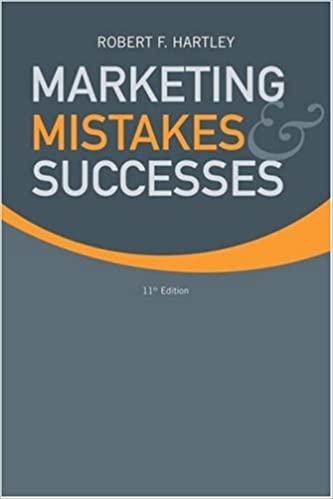Question
1. Define consumer and industrial products. Give an example of each. 2. What are the different phases/stages of the product category life cycle? 3. What
1. Define consumer and industrial products. Give an example of each.
2. What are the different phases/stages of the product category life cycle?
3. What are the four characteristics of services?
4. Think of an example of discontinuous innovation. What probably encouraged and
enabled it to become widely adopted?
5. Do you agree that marketing service products are no different to marketing goods-based
products? Give your reasons.
6. What is price elasticity, and what is known about it in competitive market situations?
7. How do the pricing strategies followed by large firms and small firms differ?
8. Explain why the cheapest brand is generally not the largest brand in its category.
9. Discuss the difference between cost-based and market-based pricing.
10. On average, if a company can raise prices by 1%, how much does their operating profit
change? Why is the answer quite different to 1%? Are there any problems with this
scenario?
11.Name and explain a different kind of retailers.
12. Should a retailer try to lengthen the amount of time people spend in its stores? Why or
1why not?
13. Why do chain retailers tend to do better than independents?
14. Many people see the digital revolution as being bad for traditional retailers, but what
advantages have there been for traditional retailers in the digital revolution?
15.Social networking will revolutionise marketing practices for international marketers.'
Assess the relevance of this statement, using examples where appropriate.
16. Adapting promotions to a new market is a waste of moneykeeping promotions
standardised across markets is much more sensible'. Discuss this statement.
17.Outline the four elements of culture and illustrate how these aspects may affect the
promotion of products in different countries
18. Within the socio-cultural environmental forces, there are some global demographic
changes marketers have to prepare for. Some of these currently include:
a) an aging population
b) a decrease in the proportion of traditional nuclear families
c) changing gender roles in the household
d) changes in attitudes towards the environment.
19What are the four major stages of conducting a rational marketing plan exercise?
20.Discuss the structure and features of a marketing plan.
21.What is the key difference between market planning and sales planning?
Step by Step Solution
There are 3 Steps involved in it
Step: 1

Get Instant Access to Expert-Tailored Solutions
See step-by-step solutions with expert insights and AI powered tools for academic success
Step: 2

Step: 3

Ace Your Homework with AI
Get the answers you need in no time with our AI-driven, step-by-step assistance
Get Started


